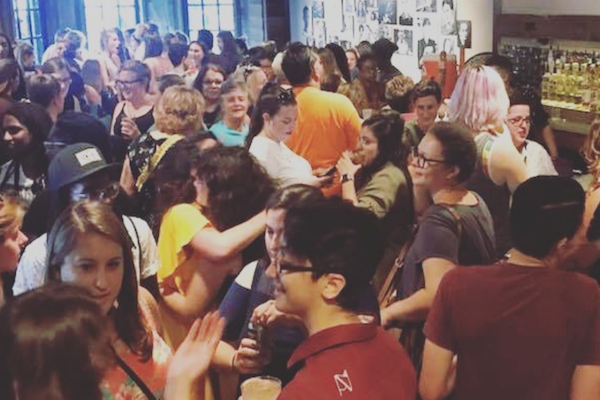In the late 1980s, there were an estimated 200 lesbian bars across the country. Today, there are just 15 left.
The Lesbian Bar Project (LBP) launched in October with the goal of saving all 15 of them. The four-week fundraising campaign is half way done and has already raised over $30,000 to split evenly between 13 of the bars. Though they are listed on the website, Sue Ellen’s in Dallas and Pearl Bar in Houston have opted out of receiving funds so that other bars can receive more.
“I remember the first time I walked into a lesbian bar. There was this feeling. This was us,” actress and comedian Lea DeLaria narrates in a two-minute video created as part of the project. DeLaria, famous for her role as Big Boo in Netflix’s Orange Is The New Black, is an executive producer of the project, which is sponsored by Jägermeister. DeLaria told The Provocateur in September that she’s “terrified for the dyke bars.”
“I’ll be honest, I’m not worried about the gay boy scene because there’s no reason to be worried about the gay boy scene…they’ll always have their scene,” DeLaria continued. “But I’m terrified for the dyke bars and the places where we can come together and be a community. Even now, if you look at Cubbyhole, it’s very mixed. The only way that they’ve been able to keep it open is to hire male bartenders and keep men coming in as the economy worsens. As women have less and less money, they have to stay home more and more.” She notes that while she thinks queer men go to bars for sex, lesbians don’t: “Dykes go to bars for company, camaraderie, and community.”
On the LBP website, many bar owners echoed the idea that these physical spaces are irreplaceable community hubs. “We need a place where we can be our authentic selves; a place where we don’t have to feel we are the lesser vessels; a place where we know that we matter,” wrote Rachel Broughton, owner of Herz in Mobile, Alabama.
The manager of one of the recipient bars, A League Of Her Own in Washington, D.C., agrees. We need a space that’s ours, always. A space that’s safe, always. That kind of relief and familiarity isn’t easy to come by,” explains Jo McDaniel.
Others shared how the current pandemic threatened their businesses more than any other challenge of the past. “Through 9/11, blackouts, blizzards, and hurricanes, Cubbyhole found a way to open its doors, and provide a safe haven for our community,” wrote Lisa Menichino, owner of Cubbyhole in New York City. March 16, 2020 was the very first time they closed in 27 years.
The other participating bars operate in Atlanta, Columbus, Denver, Milwaukee, Nashville, Philadelphia, San Diego, and Seattle. LBP co-director Elina Street told Tagg that the campaign will help these community spaces “not only to survive but thrive in a post-pandemic environment.”


